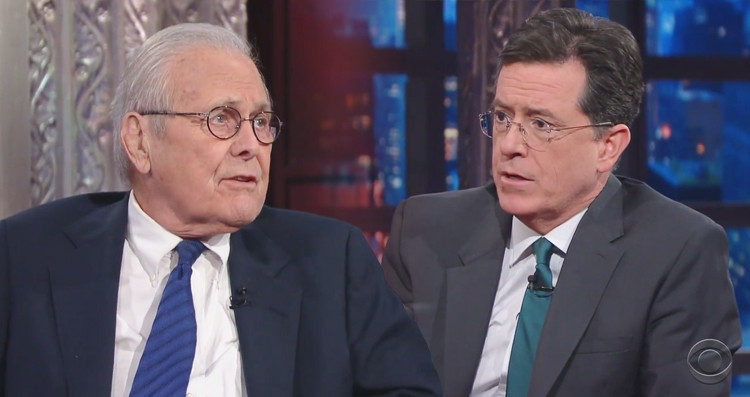
Donald Rumsfeld admits to Stephen Colbert that the American people were not told the truth leading up to the Iraq War.
Former Secretary of Defense for Presidents Gerald Ford and George W. Bush admitted to Late Night Show host Stephen Colbert that there were “known unknowns” that were deliberately withheld from the American public leading up the the 2003 invasion of Iraq.
Colbert began the discussion of the Iraq invasion by bringing up one of Rumsfeld’s most famous sayings regarding uncertainty in the world.
“As we know, there are known knowns; there are things we know we know. We also know there are known unknowns; that is to say we know there are some things we do not know. But there are also unknown unknowns—the ones we don’t know we don’t know.”
Implying that the Bush administration deliberated withheld information regarding Iraq, Colbert suggested yet another option Rumsfeld’s analysis: “the unknown knowns — which [are] the things that we know, and then we choose not to know them or not let other people know we know.”
Sensing the trap that Colbert had laid for him, Rumsfeld interjected: “I’m going to save you embarassment,” and Colbert quickly responded that: “You don’t have to do that. I can’t be embarrassed, I’m a comedian.”
Continuing with his question, Colbert referred to a recently declassified 20o2 memo from the Joint Chiefs of Staff that revealed that up to 90 percent of our knowledge of Iraq’s weapons program was based on “imprecise intelligence.”
Colbert when on to explain that this document demonstrated that while the administration believed Iraq possessed weapons of mass destruction, there was – in fact – no hard evidence supporting such a conclusion.
After explaining that he felt the administration’s intentions were sincere, he went on to ask Rumsfeld if he believed withholding the true facts was “the right thing to do.”
“I believe that everybody believed that they were there, but there was no hard proof that they were there,” he said, adding: “and yet it was presented to the American people as if there was. So there was an unknown known for the American people. It was known that there was not hard evidence, but we were presented a partial picture — and that’s the unknown known that we were denied. Do you think that was the right thing to do?”
Rumsfeld countered that he had placed that memo on his website years ago for all to see, but Colbert pressed on with his question:
“Were there things that the administration or you knew that we didn’t learn about out of the best possible intentions — which is, there were things that would undermine the case for a war you thought was necessary to save the United States,” he asked.
Rumsfeld finally returned with a straight answer, explaining:
The president had available to him intelligence from all elements of the government, and the National Security Council members had that information. It was all shared, it was all supplied, and it’s never certain — if it were a fact, it wouldn’t be called intelligence.
A clearly surprised Colbert interjected: “Wow, I think you answered my question.”
Rumsfeld responded: “intelligence is tough to do and what you do is you look at all of that and you got a certain facts that you can verify 100 percent and then there is information that is not capable of being verified 100 percent and it’s out of the aggregation of that information that presidents make decisions all the time.
Colbert followed up saying: “I guess the ultimate question is that because there turned out to be no weapons of mass destruction and because the America people, a majority, feel it was the wrong war do you think that undermines our trust of the government that it is necessary for the your intelligence apparatchik you are describing to do their job, because if you say “trust us we got this” and you get it this wrong isn’t there another level of damage that we won’t trust them next time?”
Rumsfeld answered:
I think there is always a risk that people, looking at government, will come to conclusions that they may not be right. That’s why we have a democracy. That’s why people vote and they make judgement and – no, I think most people in the United States understand that government is not perfect and – I mean look how long it takes to get snow removed. But on the other hand I think what’s really important is the intentions and the capabilities of the people and for the most part – I think it was Churchill who said “democracy’s the worst form of government except for any other that’s ever been tried.”
You can watch the exchange below, beginning with a few remarks about Donald Trump and Bernie Sanders:

You must be logged in to post a comment Login